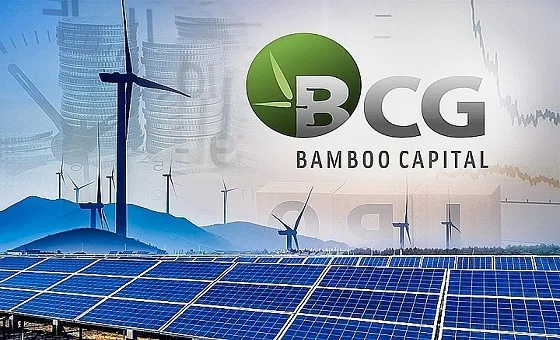
Sustained Growth and Diversified Investments
BCG, founded in 2011, operated in four primary areas: renewable energy (chiefly through BCG Energy), production, trade, and agriculture (mainly under Nguyễn Hoàng Group), construction and infrastructure (led by Tracodi), and more recently, real estate development (primarily BCG Land). During the 2021-2022 period, BCG engaged in two significant mergers and acquisitions (M&A) transactions involving AAA Insurance (in the insurance sector) and Tipharco (in pharmaceuticals and healthcare).
To secure the capital needed for these M&A deals, BCG embarked on a capital-raising spree, particularly in the 2020-2022 period. Starting with a capital of VND 1,370 billion as of September 2020, BCG had increased its capital sixfold by September 2022, reaching VND 5,334 billion—an almost fourfold increase in just two years. Notably, when considering a ten-year span, BCG's growth is even more remarkable.
In addition to issuing shares, BCG expanded its capital through corporate bond issuance. By the end of 2022, BCG's outstanding corporate bond debt had reached VND 7,533 billion, constituting half of its total financial debt of VND 14,935 billion. BCG issued corporate bonds through several affiliated companies within the Bamboo Capital "ecosystem," such as BCG Energy and BCG Land.
One particularly substantial corporate bond debt of VND 5,250 billion was attributed to the Helios Investment and Services Joint Stock Company (Helios). Helios had five bond lots maturing from June to September 2024, offering interest rates ranging from 8.5% to 11%. Helios had connections with BCG's related shareholder group; Mr. Nguyen Ho Nam (BCG's Chairman of the Board of Directors) and BCG were founding shareholders when Helios was known as Hop Diem Services Joint Stock Company.
In early 2016, Helios had a charter capital of VND 6 billion, with BCG holding a 12.7% stake, Mr. Nguyễn Hồ Nam holding 14.8%, Mr. Nguyễn Thế Hùng (Deputy Chairman of the Board of Directors and Deputy General Director of BCG) and Mr. Nguyễn Thế Tài (Vice Chairman of the Board of Directors and General Director of BCG) also being involved.
Financial Strain Due to Bond Interest Payments
The consolidated financial report as of the end of the second quarter in 2023 revealed that BCG had an outstanding bond debt totaling nearly VND 6,800 billion. This consisted of VND 4,494 billion in due bonds and more than VND 2,261 billion in long-term bonds. BCG's financial debt of VND 13,950 billion had almost half of it tied up in outstanding bond debt. Notably, some of the bonds within the Bamboo Capital "ecosystem" carried interest rates as high as 10-14% annually.
BCG Energy, in a report published in mid-2023, showed equity exceeding VND 6,287 billion with outstanding bond debt around VND 3,080 billion. Due to lower-than-expected profits, BCG Energy had repeatedly announced delays in corporate bond interest payments. For instance, in early June, BCG Energy postponed paying over VND 104 billion in interest on a batch of VND 1,500 billion 3-year bonds issued in mid-2021. By July, BCG Energy settled this overdue interest, along with incurring a fine amounting to hundreds of millions of Vietnamese dong. With trillions of VND in principal debt due for repayment in April and May 2024, BCG Energy faced substantial financial pressure.
According to Mr. Phạm Minh Tuấn, Vice Chairman of the Board of Directors of BCG, increasing interest rates had raised costs for businesses, thereby straining BCG's finances. Nevertheless, BCG managed to navigate these pressures by negotiating with investors based on prevailing market conditions, thereby avoiding the need for early capital withdrawal from investors. Currently, with the market indicating a reduction in long-term interest rates, BCG plans to continue negotiating appropriate interest rates with investors.
The "Ripe and Rotten" Scenario
BCG's leaders' explanations have not managed to allay shareholders' concerns. The challenges faced by BCG are representative of broader issues affecting businesses in hot sectors like real estate and insurance. Despite recommendations from many securities firms to invest in BCG with a target price of up to VND 12,000, BCG continues to be sold off on the Ho Chi Minh Stock Exchange (HoSE) and is currently trading at slightly over VND 7,000. This represents a significant drop from its peak price of more than VND 25,000 in November 2021, wiping out approximately 70% of its value.
Even at its relatively low price, many shareholders are wary of bottom fishing for BCG, given that internal shareholders have persistently registered to sell millions of shares. The departure of members of the Board of Directors and their family members has added to investor concerns about BCG's business outlook. This, in turn, has implications for BCG Land, which is preparing to list 460 million shares on the Unlisted Public Company Market (UPCoM) under the code BCR.
Established in 2018 with an initial charter capital of VND 600 billion, BCG Land increased its capital twice in 2022 through private share issuance, ultimately reaching VND 4,600 billion. As of the end of June, BCG Land's equity stood at VND 5,905 billion, with an outstanding bond debt-to-equity ratio of 0.42, equivalent to VND 2,480 billion. Like many other real estate firms, BCG Land holds a modest cash reserve of less than VND 20 billion. This limited cash could pose significant challenges as bond maturities loom in 2024.




















